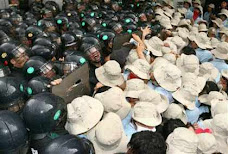
July 27, 2008, 10:47 am
Wardrobe Function: German Athletes Have T-Shirt Choice
By Naila-Jean Meyers
Germany and its athletes have been among the more outspoken Olympic participants when it comes to human rights in China.
Chancellor Angela Merkel has taken a hard line on China, saying that she will not attend the opening ceremony. (The former Chancellor Gerhard Schroder is going, reflecting two different approaches to China.) A group of German athletes designed and promoted wristbands that say Sports for Human Rights, with proceeds going to Amnesty International. Yvonne Bönisch, who won a gold medal in judo in 2004, has said she will boycott the opening ceremony to protest human rights violations in Tibet. German businesses even got into the act. The chief executive of Volkswagen, Martin Winterkorn, speaking at a shareholders’ meeting in April, urged China to “open up their society.” Volkswagen was the first foreign automaker to enter the Chinese market and is a sponsor of the Beijing Games.
So perhaps it should come as no surprise that at a send-off for the German Olympic team Saturday, the German Olympic Sports Confederation was presented with T-shirts with slogans like “Fair Games,” “Sport for Human Rights,” “Celebrate Humanity,” “Free Tibet” and “Free China.” According to Agence France-Presse, the T-shirts were given by a group of former German athletes, including Dieter Baumann, who won the 5,000 meters at the Barcelona Games in 1992, and the sprinter Ines Geipel. The shirts will be available to wear at the German House in Beijing, which has been set up by the federation for its athletes, their guests and news conferences.
“We do not want to tell athletes how to behave, but perhaps some of them will wear them in the German House, which has ex-territorial status, to show how they feel,” Geipel said.
Germany was among the countries that asked the I.O.C. for clarification on the Olympic Charter’s rules on political displays. In an memo released this spring, the International Olympic Committee prohibited athletes competing in the Beijing Games from making political statements in Olympic areas. In particular, the memo stated:
Rule 51.3 of the Olympic Charter provides that “no kind of demonstration or political, religious or racial propaganda is permitted in any Olympic sites, venues or other areas”. For the purpose of these guidelines, these areas are defined as every area for which an official Olympic accreditation is required. Compliance with this Rule implies avoiding the display of any sign, banner, poster, piece of equipment or clothing which could be perceived as any kind of demonstration or propaganda.
In rejecting calls for an Olympic boycott in March, the German Olympic Sport Confederation released a statement that described the human rights situation in China as unsatisfactory. That statement also said: “Sport is not a suitable tool to be used to apply political pressure. Sport is not in a position to solve the problems that neither the United Nations nor individual nations were able to resolve despite decades of effort. … We believe sport is there to promote dialogue and international understanding. Sport builds bridges, not walls.”































No hay comentarios:
Publicar un comentario